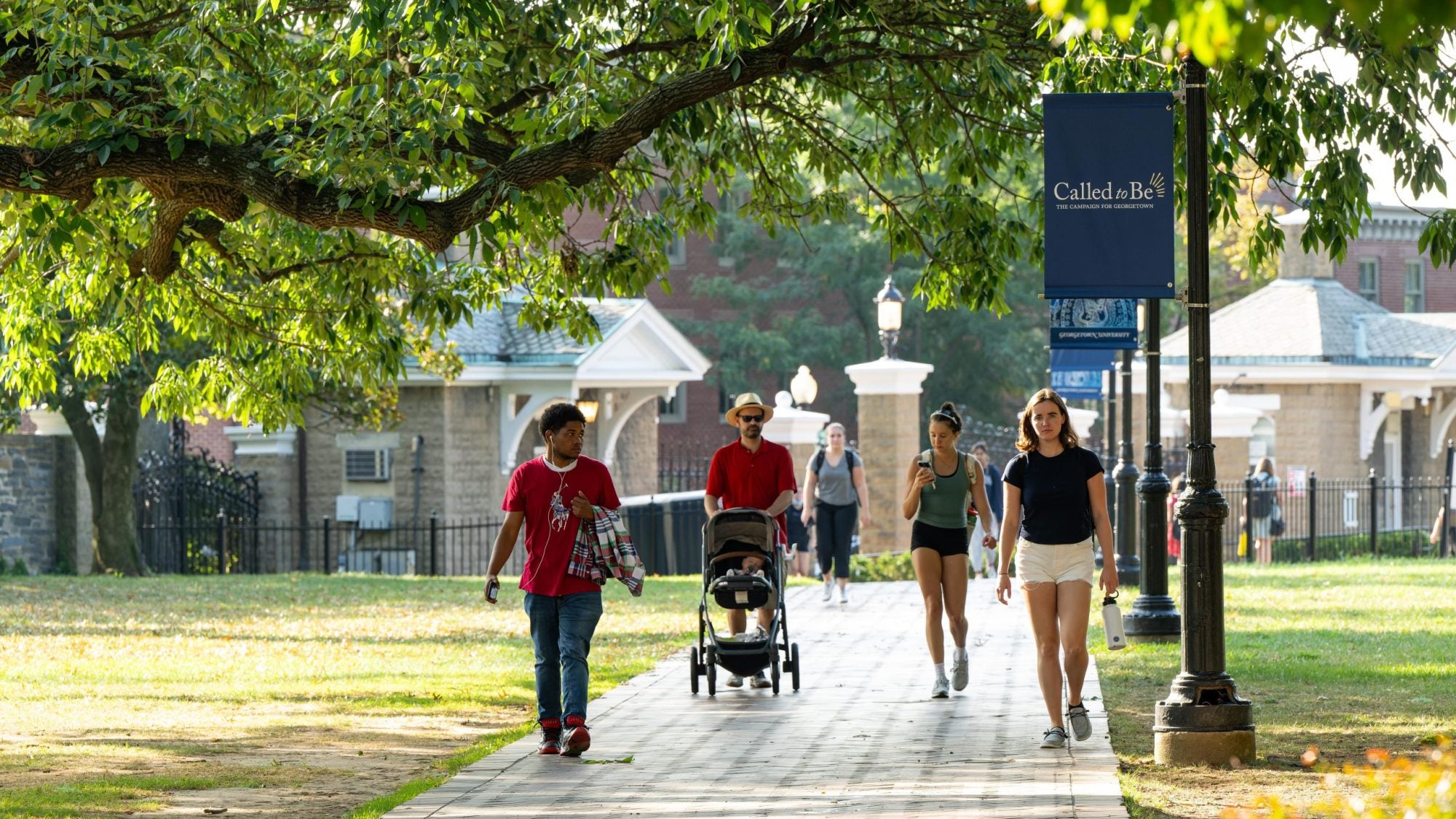Georgetown’s Board of Directors reflected on the university’s Jesuit identity, celebrated the launch of a new university-wide campaign and approved a revamped nursing degree during its annual fall meeting.
The board also welcomed its eight new members, who began their three-year terms in July.
Engaging With Our Jesuit Identity
During the mid-October meeting, the Board of Directors reviewed the Mission Priority Examen (MPE), a process for Catholic and Jesuit colleges and universities across the United States to reflect on their shared Catholic and Jesuit identities and values.
The MPE process encourages members of the Georgetown community to reflect on the seven themes laid out in the Characteristics of Jesuit Higher Education: A Guide for Mission Reflection and the four Universal Apostolic Preferences from the Society of Jesus. Over the next few months, the MPE Committee will host listening sessions for members of the Georgetown community that will culminate in a self-study document, which will be peer-reviewed by members of the Association of Jesuit Colleges and Universities in January 2024.
This year’s MPE process is led by Jeanne Lord, senior advisor in the Office of the President, and Rev. Stephen Sundborg, SJ, special assistant to the president. They are collaborating on the process with Rev. Mark Bosco, SJ, vice president for Mission & Ministry.
“We look forward to a robust dialogue within the Georgetown community on how we continue to live out our Catholic and Jesuit values,” Bosco said. “The MPE is a great opportunity for us to reflect on and deepen our commitment to the mission that inspires our university today.”
Kicking Off a New Campaign
The board also received an update on the university’s new campaign, Called to Be: The Campaign for Georgetown, a shared, $3 billion ambition to expand the university’s impact in service to the common good. The campaign has raised nearly $1.9 billion to date and seeks to advance four critical commitments: ensuring the student community thrives; shaping the future of teaching, research and learning; advancing the health and security of people and the planet; and building a stronger, more ethical society.
Board members joined other members of the Georgetown community in celebrating the campaign’s launch at an Oct. 12 event at the Smithsonian National Air and Space Museum. On Oct. 13, alumni volunteer leaders met in Gaston Hall to learn about the campaign’s commitments and to hear students, faculty and staff reflect on their callings.
Through the campaign, community members are invited to consider who they are called to be and what they are called to do as members of the Georgetown community.
“We believe that Georgetown has an opportunity to do more — to have an ever greater impact on the lives of our students and on the challenges facing our world,” President John J. DeGioia said. “We are a place that is always growing, always exploring, always seeking to become the university that we are called to be.”
School of Nursing Revises Master’s Program
The board of directors approved a resolution to offer a more flexible Master of Science Entry to Nursing Program, broadening access to a wider range of candidates.
The program, one of the five School of Nursing master’s programs, offers a pathway for students with a bachelor’s degree in another field to pursue a Master of Science in Nursing. The program builds on nearly two decades of experience with students from other careers who are preparing for a nursing career in the healthcare system. The degree’s restructuring will reduce the cost, shorten the length to completion and offer a variety of optional post-degree concentrations.
“Georgetown remains a leader in educating nurses in both the sciences and humanities to advance health and health equity in the spirit of cura personalis,” says the program’s director Sarah Vittone, associate professor of nursing.
The Future of AI in Higher Education
During the board meeting, a faculty member presented on artificial intelligence and on how it will shape higher education.
Eddie Maloney, professor of the practice of narrative literature and theory in the Department of English and executive director of the Center for New Designs in Learning and Scholarship (CNDLS), shared how the university is working to understand AI in higher education — including how students use it — and prepare for its future in teaching, research and work. As part of this work, Maloney shared creative ways faculty members are harnessing and studying AI in the classroom, including inviting students to critique ChatGPT responses and explore how AI can assist in creating electoral scenarios for policymakers to study.
He also updated the board on the university’s Initiative on Pedagogical Uses of Artificial Intelligence, which seeks to improve the student experience and learning through AI tools, foster interdisciplinary collaborations on ethical and human-centered applications of AI in education, and build best practices and shape conversations about AI across the university.
“Georgetown is applying an interdisciplinary, university-wide approach to studying AI in higher education, and I was honored to share our progress on exploring, harnessing and examining this evolving technology with the board,” Maloney said.


